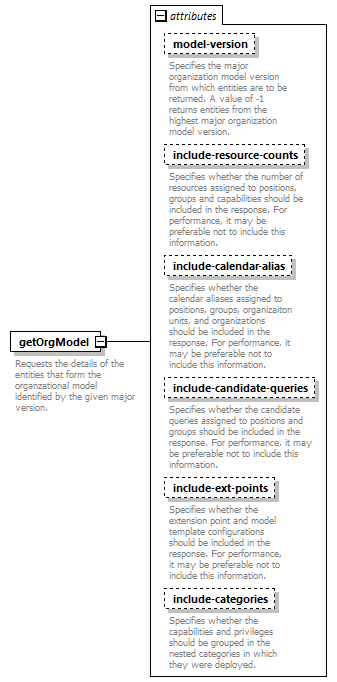| diagram |  |
||||||||||||||||||||||||||||||||||||||||||||||||||||||
| namespace | http://orgmodel.api.de.bpm.tibco.com | ||||||||||||||||||||||||||||||||||||||||||||||||||||||
| properties |
|
||||||||||||||||||||||||||||||||||||||||||||||||||||||
| attributes |
|
||||||||||||||||||||||||||||||||||||||||||||||||||||||
| annotation |
|
||||||||||||||||||||||||||||||||||||||||||||||||||||||
| source | <xs:element name="getOrgModel"> <xs:annotation> <xs:documentation>Requests the details of the entities that form the organzational model identified by the given major version.</xs:documentation> </xs:annotation> <xs:complexType> <xs:attribute name="model-version" type="xs:int" use="optional" default="-1"> <xs:annotation> <xs:documentation>Specifies the major organization model version from which entities are to be returned. A value of -1 returns entities from the highest major organization model version.</xs:documentation> </xs:annotation> </xs:attribute> <xs:attribute name="include-resource-counts" type="xs:boolean" use="optional" default="false"> <xs:annotation> <xs:documentation>Specifies whether the number of resources assigned to positions, groups and capabilities should be included in the response. For performance, it may be preferable not to include this information.</xs:documentation> </xs:annotation> </xs:attribute> <xs:attribute name="include-calendar-alias" type="xs:boolean" use="optional" default="false"> <xs:annotation> <xs:documentation>Specifies whether the calendar aliases assigned to positions, groups, organizaiton units, and organizations should be included in the response. For performance, it may be preferable not to include this information.</xs:documentation> </xs:annotation> </xs:attribute> <xs:attribute name="include-candidate-queries" type="xs:boolean" use="optional" default="false"> <xs:annotation> <xs:documentation>Specifies whether the candidate queries assigned to positions and groups should be included in the response. For performance, it may be preferable not to include this information.</xs:documentation> </xs:annotation> </xs:attribute> <xs:attribute name="include-ext-points" type="xs:boolean" use="optional" default="false"> <xs:annotation> <xs:documentation>Specifies whether the extension point and model template configurations should be included in the response. For performance, it may be preferable not to include this information.</xs:documentation> </xs:annotation> </xs:attribute> <xs:attribute name="include-categories" type="xs:boolean" use="optional" default="false"> <xs:annotation> <xs:documentation>Specifies whether the capabilities and privileges should be grouped in the nested categories in which they were deployed.</xs:documentation> </xs:annotation> </xs:attribute> </xs:complexType> </xs:element> |
attribute getOrgModel/@model-version
| type | xs:int | ||||
| properties |
|
||||
| annotation |
|
||||
| source | <xs:attribute name="model-version" type="xs:int" use="optional" default="-1"> <xs:annotation> <xs:documentation>Specifies the major organization model version from which entities are to be returned. A value of -1 returns entities from the highest major organization model version.</xs:documentation> </xs:annotation> </xs:attribute> |
attribute getOrgModel/@include-resource-counts
| type | xs:boolean | ||||
| properties |
|
||||
| annotation |
|
||||
| source | <xs:attribute name="include-resource-counts" type="xs:boolean" use="optional" default="false"> <xs:annotation> <xs:documentation>Specifies whether the number of resources assigned to positions, groups and capabilities should be included in the response. For performance, it may be preferable not to include this information.</xs:documentation> </xs:annotation> </xs:attribute> |
attribute getOrgModel/@include-calendar-alias
| type | xs:boolean | ||||
| properties |
|
||||
| annotation |
|
||||
| source | <xs:attribute name="include-calendar-alias" type="xs:boolean" use="optional" default="false"> <xs:annotation> <xs:documentation>Specifies whether the calendar aliases assigned to positions, groups, organizaiton units, and organizations should be included in the response. For performance, it may be preferable not to include this information.</xs:documentation> </xs:annotation> </xs:attribute> |
attribute getOrgModel/@include-candidate-queries
| type | xs:boolean | ||||
| properties |
|
||||
| annotation |
|
||||
| source | <xs:attribute name="include-candidate-queries" type="xs:boolean" use="optional" default="false"> <xs:annotation> <xs:documentation>Specifies whether the candidate queries assigned to positions and groups should be included in the response. For performance, it may be preferable not to include this information.</xs:documentation> </xs:annotation> </xs:attribute> |
attribute getOrgModel/@include-ext-points
| type | xs:boolean | ||||
| properties |
|
||||
| annotation |
|
||||
| source | <xs:attribute name="include-ext-points" type="xs:boolean" use="optional" default="false"> <xs:annotation> <xs:documentation>Specifies whether the extension point and model template configurations should be included in the response. For performance, it may be preferable not to include this information.</xs:documentation> </xs:annotation> </xs:attribute> |
attribute getOrgModel/@include-categories
| type | xs:boolean | ||||
| properties |
|
||||
| annotation |
|
||||
| source | <xs:attribute name="include-categories" type="xs:boolean" use="optional" default="false"> <xs:annotation> <xs:documentation>Specifies whether the capabilities and privileges should be grouped in the nested categories in which they were deployed.</xs:documentation> </xs:annotation> </xs:attribute> |
WSDL documentation generated by XMLSpy WSDL Editor http://www.altova.com/xmlspy